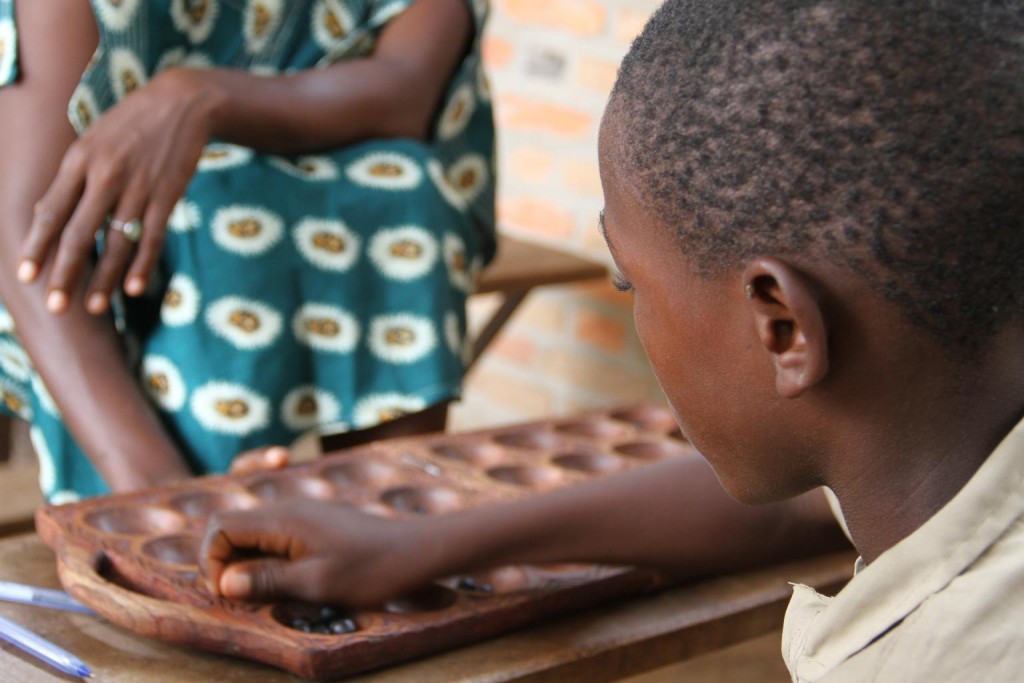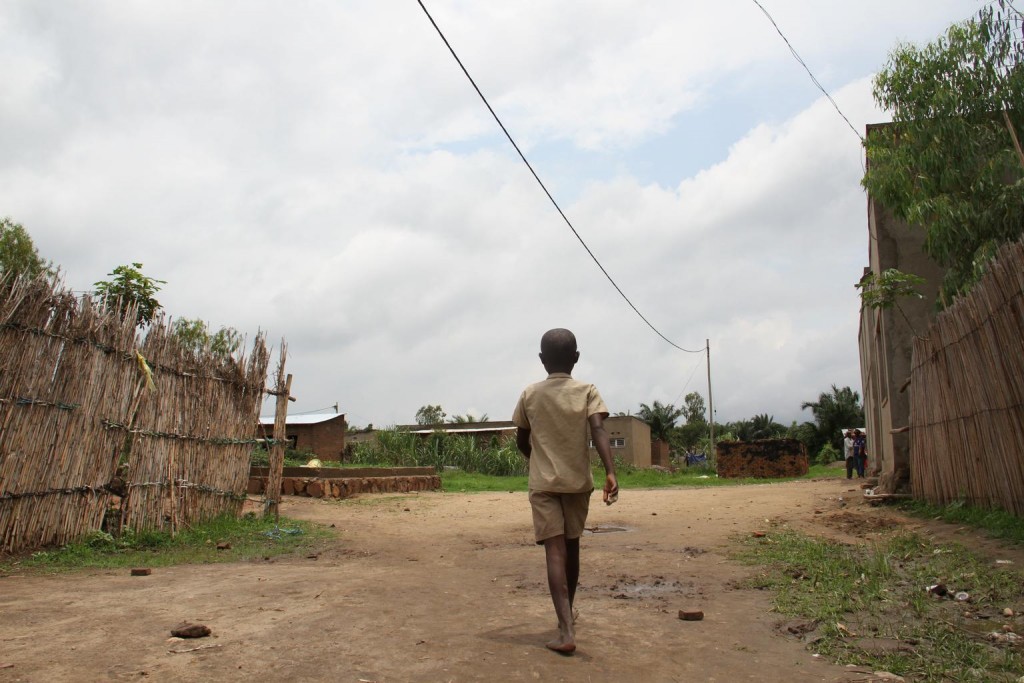Stolen childhoods: In Burundi, growing up amid violence
2015-12-17
Gustave (left), 89, and his wife took in their five grandchildren, including Patrice and Jérémie (right), after their parents passed away. Until the outeak of violence earlier this year, the children had grown up in a peaceful environment.
By Eliane Luthi
For children exposed to the continuing violence in Burundi, providing them proper care, support and protection is critical to helping build a more peaceful future.
BUJUMBURA, Burundi / HONG KONG, 17 December 2015 – Deep within one of the recent hotspots of violence in Burundi’s capital, Bujumbura, in a modest courtyard dotted with muddy puddles, sits a white-haired 89-year-old carpenter at work on a new stool. He and his wife, who leans heavily on a crutch, are the sole caregivers of five young grandchildren, aged 8 months to 11 years. Their own children have, over the years, all died.
Gustave hopes to sell his newly faicated stool for 3,000 Burundian Francs – a little under HK$15 (US$2). His eyesight is failing, and his hands not as steady as before, but it is with this income and some of the farming his wife still does that the family is able to survive.
Things were never easy for this family of seven, but they have gotten especially difficult since the onset of the crisis in April, when political and election-related violence led to widespread clashes, raids and killings, with their neighborhood one of the hardest hit. An estimated 340 people have been killed since the onset of the crisis – among them 17 children, all by gunfire or grenade blast.
Burundi is a country that has known cycles of violence, with the last conflict ending in 2005. Gustave’s grandchildren, who were growing up in a peaceful environment, are now being exposed to violence for the first time.
Seeing violence too early
Jérémie, Gustave’s 11-year-old grandchild, remembers the first time he saw violence.“I was going to watch a football and rugby game at the communal pitch,” he recalls. “The game hadn't started yet. I was with my little nephew Patrice and other friends. There was tear gas and stones being thrown. It was the first time I saw clashes like that. I was so worried because I thought people I knew might be caught up in the fighting. I felt like I was in danger.
”Patrice, a quiet 8-year-old whose belly protrudes through his terrycloth T-shirt, fiddles with a thread in his shorts. He tends to cope with his own trauma by keeping to himself, but when he does speak, his emotions tumble out all at once.
“What hurts me is to see people get assassinated, even though they didn't do anything,” he says earnestly. He gestures to his stomach. “Like our neighbor Salif, who got hit with a bullet here. I was in the street with the other children when it happened. I was scared, I was angry, but I didn't cry.”

© UNICEF Burundi/2015/Luthi A drawing made by a child who has witnessed violence in Bujumbura. “Some children have better coping mechanisms than others: When faced with problems, they find solutions, whereas others run away from problems,” says Etienne, a psychologist at a UNICEF-supported child-friendly space in Bujumbura.
Sadly, the experience of these two children is not an exception, and ensuring children and youth develop healthy, resilient responses to violence is critical to ensuring a more peaceful future for the country’s children.
“I try to flee, but I can’t move”
Jérémie and Patrice both attend a child-friendly space supported by UNICEF in their neighborhood, one of 28 spaces now operating in Bujumbura to ing much-needed psychosocial support and recreational activities to vulnerable children.
“In the morning, we start with hygiene,” says Natascha, the deputy director of the centre. “Then there is studying, and games such as card games, traditional dances and football. We also offer meals at lunchtime and English classes once a week.”
One of the key features of the centre is providing access to psychological help for the children who need it most. Jérémie and Patrice are among them.“At school, I often am disturbed with thoughts,” admits Jérémie. “And I have a lot of nightmares. I often dream about raids. I see rifles and I try to flee, but I can't move. I have them almost every night. I pray with my grandparents before I go sleep so that I don't have nightmares.”
“One of the major challenges among these children is nightmares – nightmares about fleeing, nightmares about being persecuted,” says Karim, one of the psychologists who works at the centre. “Another sign is children keeping to themselves, isolating themselves from others.
”In the case of Jérémie’s friend Jamel, a 12-year-old whose father was the victim of a violent death two years ago, witnessing recent political violence has ought back unwelcome flashes.
“One day I was going to my aunt’s house, and I saw crowds of people, so I went to go see what was happening,” he remembers. “I saw a young man lying on the ground who was hit by a bullet in the shoulder. I ran home. I was scared and I thought, I have to save my life.
”But in the absence of his mother and as the new head of household, Jamel’s coping mechanism has been to focus on making sure his younger others and sisters are ok. He walks with confidence and looks people in the eye.
“Jamel is a case that is difficult to manage,” explains Etienne, another psychologist.
“The child identifies completely as an adult. He will say that, even if there are gunshots, ‘I am ok’. But if you talk to him longer, he always goes back to his father, or his mother who has no means. There is deep-seated frustration.”
Traumatized lives
Some children have not just witnessed violence: some have experienced it firsthand. That’s the case of Joanne, 15, who was a victim of rape during one of the most intense clashes, when she was at home alone due to school closures.
“He told me, ‘undress or I will kill you,’” she says, speaking faintly with her eyes fixed on the floor. “I said, ‘for the love of God, don't do that.’ He undressed me by force. It all happened when there were a lot of gunshots.”
“This child is overcoming trauma,” explains Etienne, the psychologist. “She has black outs and has lost her memory. She tends to stay at home, she no longer goes to the market or to church. She has a feeling that her life is worth nothing.
“Whenever I see men with arms, I have flashbacks of what happened. I'm afraid it might happen again, or that it might happen to my sister or my friends,” says Joanne.
Child-to-child counselling
“We're setting up talking groups between children who have similar problems,” explains Etienne. “We ing up a subject, for example nightmares, and then the children discuss how they manage to overcome their fear. Some children have better coping mechanisms than others: when faced with problems, they find solutions, whereas others run away from problems. Those children can learn from the other children.”
Professional support from adults and advice from other children is the first step to recovering a slice of their childhood. But an end to the current insecurity and violence are critical to the creation of an environment where all children’s rights are fulfilled – and in which all children can go on to fulfill their true potential.
“I'd like children to grow up to respect others,” says Jérémie as he sits with his family in their courtyard. “And for there to be solidarity between people.”
| Donate now to support UNICEF’s programmes worldwide |











